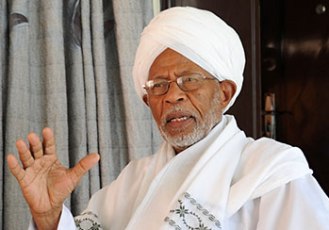Sudan’s PCP decides to join post-dialogue government
January 13, 2017 (KHARTOUM) – Sudan’s opposition Popular Congress Party (PCP) of the late Islamic leader Hassan al-Turabi on Friday has decided to join the upcoming government of national concord led by the National Congress Party (NCP).

The opposition groups boycotted the process because the government didn’t agree on humanitarian truce with the armed groups and due to its refusal to implement a number of confidence building measures.
Last October, the political forces participating at the national dialogue concluded the process by signing the National Document which includes the general features of a future constitution to be finalized by transitional institutions.
On October 25th, Sudanese presidency deposited new amendments to the 2005 transitional constitution with the parliament, which allow introducing a Prime Minister post, increasing the number of national MPs and adopting the name of the Government of National Concord.
In a meeting that lasted until the early morning hours of Friday, PCP’s Leadership Commission decided to join the government of national concord which is expected to be formed next month.
In a press release extended to Sudan Tribune on Friday, PCP Secretary General Ibrahim al-Sanosi said the Leadership Commission issued a decision to “participate in the government of national concord at all levels following the approval of the constitutional amendments agreed upon and especially these pertaining to freedoms”.
On Wednesday the PCP disclosed it has agreed with the ruling NCP to deposit the constitutional amendments pertaining to public freedoms to the parliament for approval soon.
PCP’s decision to join the government of national concord has stirred controversy within the party ranks with some groups, particularly the youths, rejecting the idea categorically and others who say participation in the government is contingent upon approval of the freedoms bills.
The Islamist Popular Congress Party splinted from the NCP since 1999, and joined the opposition ranks since that time but it supported the dialogue process and participated in all its forums.
(ST)
